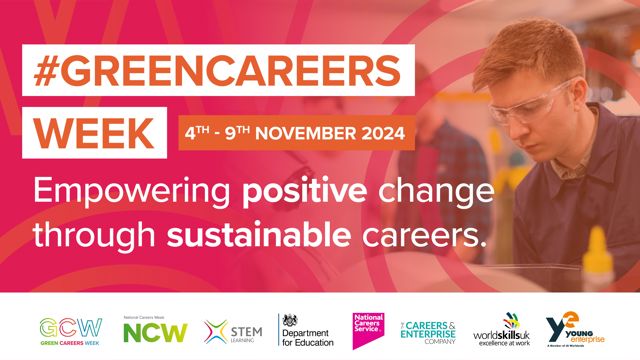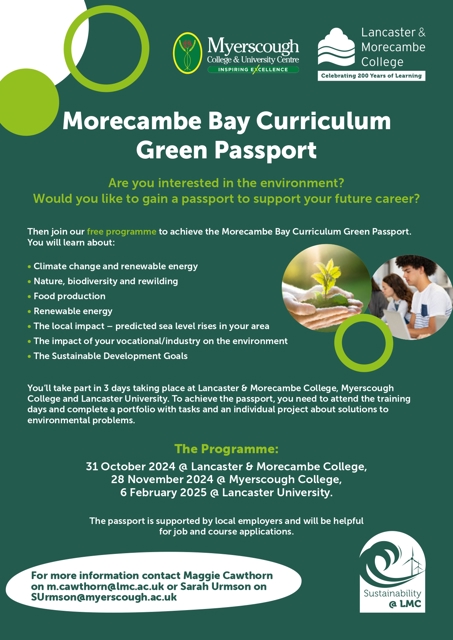
FEATURE: Green Careers Week highlights jobs that make a difference to the planet
Published: Monday 4 November 2024It’s Green Careers Week, highlighting the many professions that make a real difference to global climate change.

A green career can be any job, role or occupation that contributes to preserving or restoring the environment and our planet. It can be any industry, not just those seen as ‘green.’ Green skills are abilities, attributes, values, attitudes, knowledge, and technical skills needed to adapt services, processes and procedures to support climate change.
Green careers are a fast-growing global employment sector that touches every company, employer, employee, and education establishment, with huge opportunities to study in such sectors at Myerscough.
Tackling climate change is a global effort. In 2019, the UK pledged to reach Net Zero by 2050. Everyone can play their part in contributing towards this goal and young people are especially important. As the future workforce, they need the right education and tools to support them in developing innovative ways of doing things better. We need to help them find rewarding and fulfilling career opportunities that positively impact the environment.

Research shows that high numbers of 16-25 year olds are worried about climate change, many feel the future is frightening and a significant number don’t feel they have a voice when discussing solutions.
Myerscough recognises its role in giving young people hope that they can be agents of change. This includes providing hands-on activity, guidance and study programmes so teens can follow a green career pathway in their chosen field.
This includes many subject areas including agriculture, horticulture, agricultural engineering, landscape architecture, arboriculture and urban forestry, land and wildlife, sportsturf management, and many more.
The built environment
In the simplest terms, green careers include roles within businesses that benefit the environment and conserve natural resources. These roles have been growing over recent years and are bound to increase further as the necessity for greater energy efficiency becomes more urgent.
The great outdoors
When thinking about the environment it seems natural to consider the great outdoors and there are plenty of roles that focus on protecting the land and wildlife around us. There are 15 national parks in the UK, covering over 10% of the land mass and welcoming 100 million visitors each year. They need looking after!
Then there’s local parks and commons, a myriad of stately homes with public access, and 100s of nature reserves.
Consultancy
Not everyone is practical and hands-on, but that doesn’t mean there aren’t roles for people with business and project management skills to contribute to helping businesses go green. Sustainability consultants advise how companies can lower their carbon footprint through assessing and evaluating the business. What’s interesting here is that virtually all large companies have sustainability teams.
This means for students keen on certain industries but without the relevant skills, it’s possible to get a role in that sector looking at their sustainability impact. Likewise, choosing to work for a company that has a reputation for ethical practices won’t tie them into a job role, but will enable them to pursue work with companies that are aligned with their values.
Farming, food production & distribution
We can’t live without food! There may be variances in the impact of meat or meat free diets, but all our food has a significant environmental impact. It’s not just in growing/producing it.
Take a stroll round the supermarket to see first hand what’s involved. Food has to be harvested, processed, packaged and transported. Any role within the food industry has the potential to be ‘green’, including educating people to eat local, natural and in-season produce. You need only look at what sells in supermarkets to know that for many consumers convenience often trumps good intentions.
Applications are open now for September 2025 entry across a range of school leaver and degree level programmes, in addition to many sector leading apprenticeships with start dates throughout the year.
Myerscough College is also involved in the Morecambe Bay Curriculum Green Passport initiative.

The scheme is a free programme where attendees learn about:
- Climate change and renewable energy
- Nature, biodiversity and rewilding
- Food production
- Renewable energy
- The local impact – predicted sea level rises in your area
- The impact of your vocational/industry on the environment
- The Sustainable Development Goals
